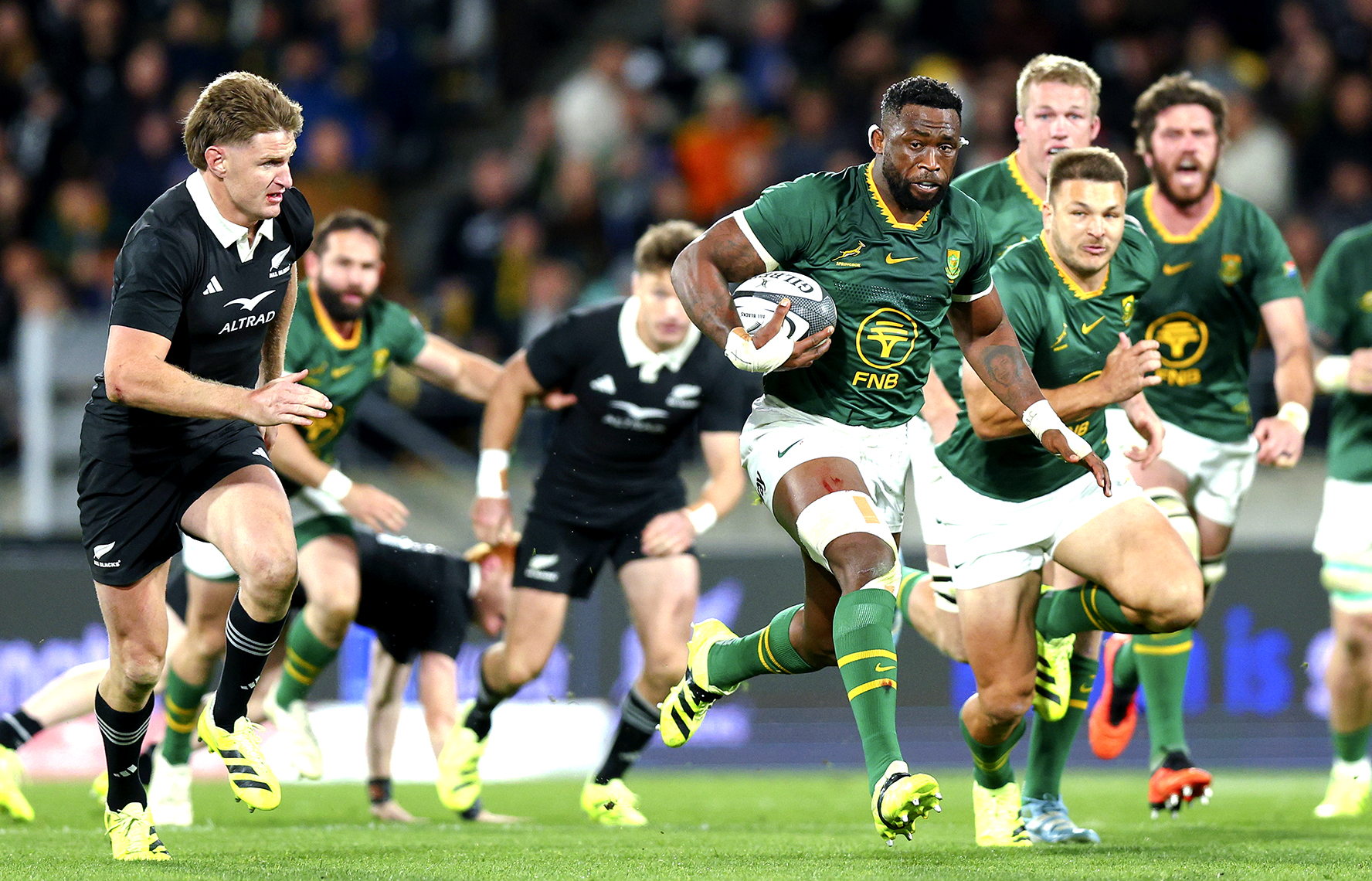
Like an active volcano, with a gas leak here and a small eruption there, we saw signs that the Springboks were on the brink of an epic attacking eruption at some point soon.
The opening 20 minutes at Ellis Park against the Wallabies in mid-August, when the Boks ran into a 22-0 lead was a glimpse of the team’s attacking potential.
That match imploded spectacularly as the Boks lost 38-22, but in the flotsam and jetsam of the aftermath, there were signs of something fearsome bubbling below the surface.
The eruption finally started on 13 September, at about 10am South African time. The molten lava of the Boks’ attack spewed out in the second half of Saturday’s epic 43-10 dismantling of the All Blacks in Wellington.
The Boks scored five tries and 36 unanswered points against the team that went into the match ranked No 1 in the world in 40 unforgettable minutes.
South Africans will remember it forever, as one of the greatest days in the country’s sporting history. New Zealanders will also have it etched into their psyche, but for much less joyful reasons.
It was surely the best half of rugby the Boks have produced in the professional era. It tops the first half of their Pool clash against England at Rugby World Cup 2007. In Paris that night, the Boks scored 20 unanswered points on their way to a 36-0 win against the reigning world champions.
But that was a surgical and cold dissection of England.
/file/dailymaverick/wp-content/uploads/2025/09/2235151292.jpg)
In Wellington this past weekend, the Boks’ second stanza performance was scorching and destructive. It was also a display of bravery, delivered with fiery ambition and sheer joy. The players played with a smile, knowing that what they had spent months working on, was clicking.
Sports psychologists talk about a “flow state”. It’s when athletes enter a mental place where they are not even fully conscious of their actions because they are so in tune with the demands of what they are doing.
This was as close to a collective flow state as a team could muster.
Everyone seemed to know exactly what to do at any given moment. The ambition and demands of the challenge were matched by their skill. They almost always chose the best option and then executed it superbly.
Meltdown
The Wellington massacre has sent New Zealand rugby pundits and fans into meltdown. Some of the reactions have been completely over the top, with funereal language and words such as “disaster” and “shame” doing the rounds.
It’s completely unhinged in a world teeming with wars, social ills, starvation and misery. Yet it’s also understandable, because if any nation comprehends what rugby means to New Zealand, it’s South Africa.
The national rugby teams in both countries are symbols of excellence and pride, of hope and ambition and of history and tradition. When one of them is crushed, the nation naturally questions those values and traits.
But it’s doubtful the All Blacks could have done anything to stop the momentum once it swung the way of the Boks.
/file/dailymaverick/wp-content/uploads/2025/09/2235281018.jpg)
The key moment perhaps, was Cheslin Kolbe’s 80-metre intercept. The All Blacks, with their first entry to the Bok 22-metre area, had a three-man overlap. Kolbe’s genius, focus and presence of mind resulted in what should have been a 14-0 lead become a 7-7 game.
I’d like to think the Boks had been playing well enough to come back and win anyway. We’ll never know, but it’s an example of how a moment can change momentum.
Something brewing
The Boks narrowly lost 24-17 at Eden Park a week before Wellington. Yet, it felt like they were the better team. Mistakes cost them, but in the second half in Auckland there was a massive momentum shift.
I wrote in the match report after the Eden Park defeat that: “The Boks showed enough to suggest that they can win in Wellington next week with a strong second-half performance in Auckland.”
That brewing feeling was there.
Coach Rassie Erasmus made a premeditated seven changes to the team, but the same feeling persisted — the All Blacks were there for the taking.
It would be untruthful to suggest that the margin of victory in Wellington was expected, but in retrospect it’s not as big a surprise as it initially felt.
The margins in Test rugby among the seven top teams in the world are tiny.
One lost line-out, a great tackle, or a piece of individual brilliance can change the course of the game.
Look what happened at Ellis Park a mere four weeks prior to Wellington. Australia weathered the Boks’ storm and stayed in the fight. The Boks, to use a boxing analogy, punched themselves out, and the Wallabies were good enough to punish their staggering opponents.
All Black fans should take heart from the Bok turnaround in the space of four weeks.
In Wellington, despite trailing 10-7 at half-time, it really felt like the Boks were well on top. They had been over the All Blacks’ tryline twice, with RG Snyman’s try disallowed for a small knock-on by Cobus Reinach in the build-up and Cheslin Kolbe being brilliantly stopped by Jordie Barrett in the in-goal area.
The Boks nearly scored with the first play of the game when Aphelele Fassi burst onto a lovely flat ball from Sacha Feinberg-Mngomezulu. Seconds later the Boks had a line-out five metres from the All Blacks’ goal line and botched it.
/file/dailymaverick/wp-content/uploads/2025/09/2235172756.jpg)
It was a massive error. There were others — the Boks turned the ball over 16 times in the first half with eight handling errors among the mistakes.
That kept it tight at the break. But the bubbling, brooding feeling remained that the Boks were in control.
And that feeling stemmed from the sight of a team that continued to be positive — brave — and continued to take the game to the All Blacks.
They refused to shrink into a negative gameplan to try to eke out a win. They showed that they had come to Wellington with a team designed to execute a clear plan, and they were going to see it through to the end.
They must have sensed that the All Blacks were creaking. The players knew they were dominating the little battles — contact, the gainline and increasingly the set piece.
This was the Boks’ saying: “Our traditional strengths are working, now we must make them count.” They unleashed mayhem after the break.
Two minutes into the second half the ambition manifested. A strong Bok scrum, a little burst by Reinach on penalty advantage, followed up by a powerful surging run by captain Siya Kolisi lit the touchpaper.
Centre André Esterhuizen’s deft pick-up from the ruck after Kolisi’s run, followed by a brilliant pass off his left hand to Kolbe, allowed the great wing to score.
A passage of play that took a few seconds from start to finish summed up the entire Bok evolution. Power, pace, awareness, skill and execution.
And they continued the theme to the end.
The challenge now is to aspire to match that performance every week. It would have given the players untold belief in what they have been working on. They lived the heights they’re capable of reaching on that distant Wellington field.
Barriers and doubts have been eradicated — they’ve seen their own potential. Now it’s up to the coaches and the players to bottle the lightning and strike again and again and again. DM





 Bok captain Siya Kolisi makes a break during their Rugby Championship match against New Zealand at Sky Stadium on 13 September 2025 in Wellington, New Zealand. (Photo: Hagen Hopkins / Getty Images)
Bok captain Siya Kolisi makes a break during their Rugby Championship match against New Zealand at Sky Stadium on 13 September 2025 in Wellington, New Zealand. (Photo: Hagen Hopkins / Getty Images)